Making Aquaculture Cooperatives in Mekong Delta Inclusive and Bankable
The Mekong Delta, known as Vietnam's "rice bowl," is vital to the country's agriculture, famed for its rice and growing aquaculture industries. Home to 18 million people across 12 provinces and one city, this 40,000 square kilometer region is the most productive for brackish and freshwater aquaculture due to its favorable conditions and abundant resources. Recently, the Vietnamese government, with international support, particularly from the Netherlands, has focused on maximizing the region's potential. A significant initiative in this effort is the MACIB project—"Making Aquaculture Cooperatives in the Mekong Delta Inclusive and Bankable."
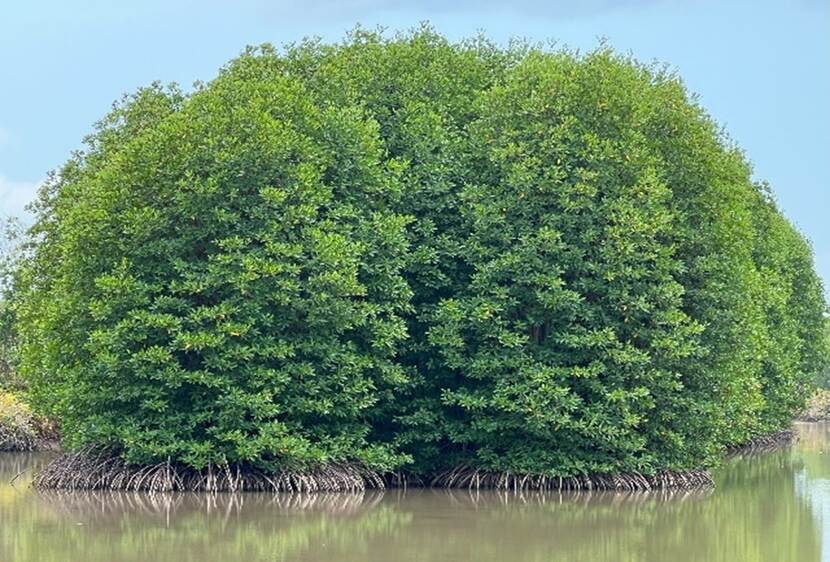
The essence of MACIB
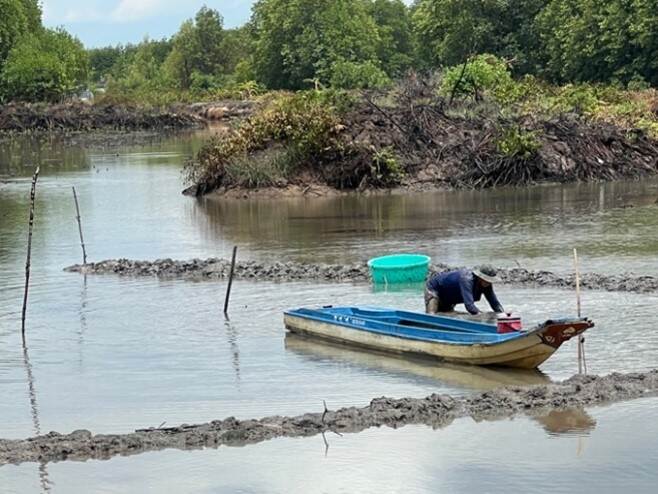
Funded by the Dutch Government, this two-year project is a collaboration between the Agriterra, aquaculture and private sectors, local stakeholders, and shrimp and pangasius smallholder farmers in Tra Vinh, Soc Trang, Ca Mau, and Bac Lieu provinces. Part of the broader combi track sustainable aquaculture initiative, this project aligns with Vietnam's master plan for the Mekong Delta, focusing on sustainable agricultural value chains. The MACIB project aims to professionalize and financially empower aquaculture cooperatives, making them self-sufficient, attractive to financial institutions, and more inclusive and sustainable.
At a roundtable consultation on May 3, 2024, Deputy Director of the Department of Fisheries, Mr. Nhu Van Can, endorsed the MACIB Project and pledged steadfast support. He appreciated the project's alignment with the Department's strategic priorities, noting its unique objectives and potential to enhance connectivity and collaboration among small-scale farmers. He also highlighted the project's role in promoting cooperatives within the fisheries industry.
Goals and objectives
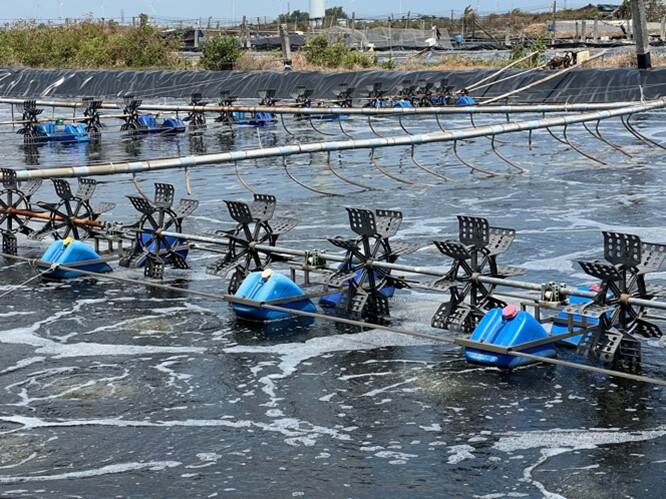
The MACIB project aims to transform aquaculture cooperatives into professional and robust entities capable of managing their business models effectively. This transformation is essential for their critical role in the aquaculture supply chain. The project emphasizes developing sound business models and solid cooperative organizations to ensure long-term viability and success. It also focuses on enhancing services to member farmers, particularly in sustainable aquaculture production, promoting environmentally friendly.
A key pillar of the MACIB project is inclusivity, focusing on empowering underrepresented groups, particularly women and youth. By fostering active participation and leadership among these groups, the project aims to create a more equitable aquaculture sector. This is achieved through targeted training, leadership development initiatives, and cooperative policies promoting gender and youth inclusion. The overarching goal is to ensure these marginalized groups have a voice and a stake in the aquaculture sector's future.
The approach
The MACIB project employs a comprehensive approach with tailored advice and a detailed training package for Mekong Delta aquaculture cooperatives. This is structured into an 8-step result management plan, encompassing cooperative scoping and assessment, developing farmer-led business models, enhancing sustainable service provision, promoting climate-smart aquaculture practices, and strengthening lobbying and advocacy efforts.
A central activity of the MACIB project is promoting farmer-led business initiatives, encouraging farmers to develop and manage business models, and fostering ownership and accountability. The project also focuses on sustainable service provision models to support member farmers effectively. This includes facilitating market linkages, strengthening financial management, and providing access to essential resources and technologies.
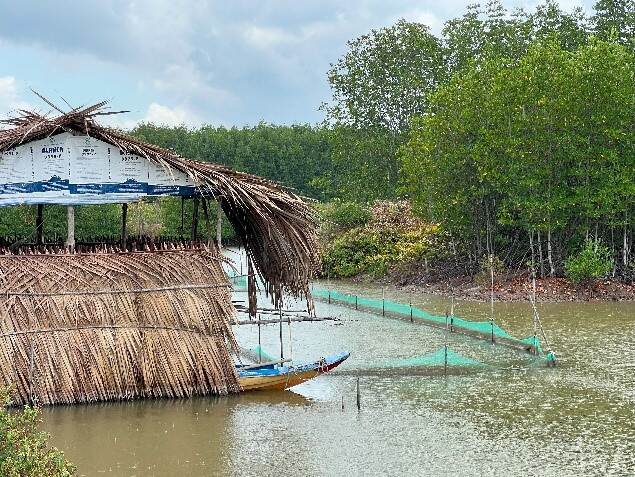
Climate-clever cooperatives are a cornerstone of the MACIB project's goals. The project is dedicated to preserving the long-term sustainability of the aquaculture sector in the Mekong Delta by championing this innovative approach. This encompasses a range of initiatives, including scoping climate issues, conducting self-assessments with the climate clever check tool, organizing climate-smart workshops to pinpoint priority solutions and develop action plans, and providing assistance to cooperatives in adopting and implementing climate-smart Aquaculture (CSA) Practices. These efforts play a crucial role in mitigating the impacts of climate change and bolstering the sector's resilience against environmental challenges.
Impact and future prospects
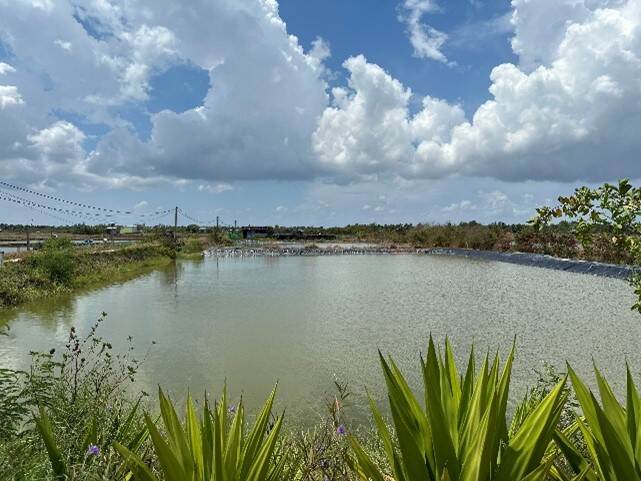
The MACIB project is set to have a significant impact on the Mekong Delta's aquaculture sector. By creating self-sufficient, bankable, and inclusive cooperatives, the project aims to enhance the competitiveness and sustainability of aquaculture practices. This will lead to higher revenue for cooperatives, better service provision for farmers, and greater inclusion of women and youth. In the long term, the project is expected to attract more investment, form new women's and youth councils within cooperatives, and promote the adoption of climate-smart practices. Additionally, by strengthening policy dialogue and engagement, the project will help create a supportive environment for sustainable aquaculture.
The MACIB project's success hinges on its collaboration with other initiatives and projects in the region. By aligning with the EmpowerYouth4Food campaign, there's an opportunity to boost inclusivity and sustainability in aquaculture cooperatives. This collaboration can equip youth with the skills to lead aquaculture initiatives, fostering a more dynamic sector. Furthermore, partnering with ShrimpTech Vietnam can leverage technology and best practices to enhance productivity and sustainability. Addressing challenges like disease management and environmental impact ensures long-term competitiveness and sustainability in the aquaculture sector.
The MACIB project's long-term outcomes are anticipated to be transformative, with far-reaching effects. Increased investment in value-added enterprises and commercial contracts will bolster the aquaculture sector's strength and dynamism. The formation of new women's and youth councils within cooperatives will enhance inclusivity and grant these groups meaningful roles in decision-making. Adoption of climate-smart practices will bolster sector resilience to environmental challenges. Strengthened dialogue and policy engagement will pave the way for an enabling environment conducive to sustainable growth.
In conclusion, the MACIB project embodies a comprehensive and inclusive approach to sustainable development in the Mekong Delta. By addressing economic, social, and environmental aspects of aquaculture, it promises a more resilient and prosperous future for the region's farmers and communities. This initiative showcases the effectiveness of international collaboration and innovative strategies in driving sustainable growth. With the collective efforts of stakeholders, the MACIB project is positioned to create a lasting positive impact on the Mekong Delta's aquaculture sector, securing its significance in Vietnam's agricultural landscape for years ahead.
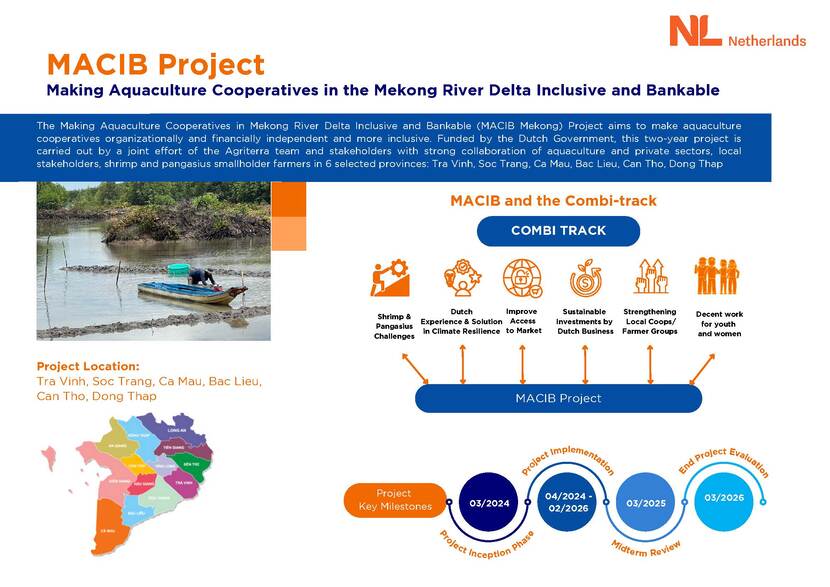
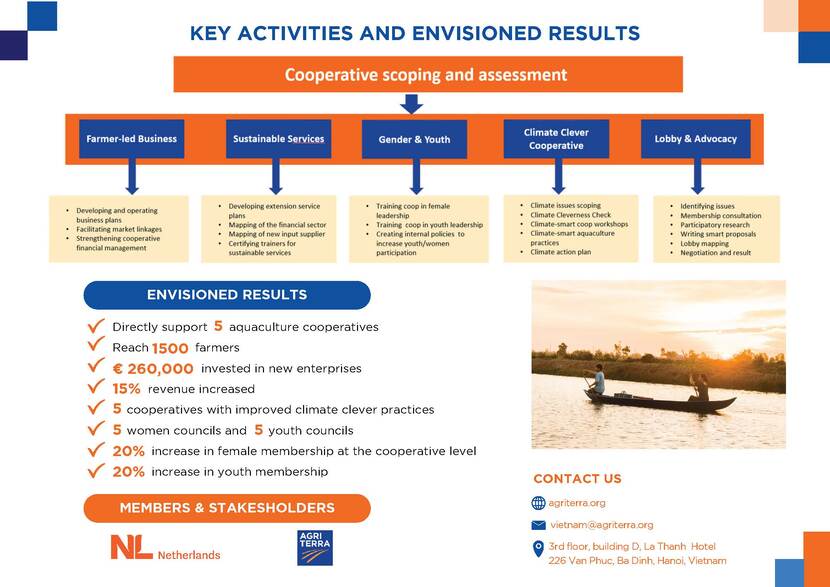
Do you have any questions for the agriculture department please send an email to HAN-LNV@minbuza.nl. For the latest updates, news funding opportunities and more, follow us on Twitter @AgroVietnam and LinkedIn Netherlands Agricultural Network in Vietnam.